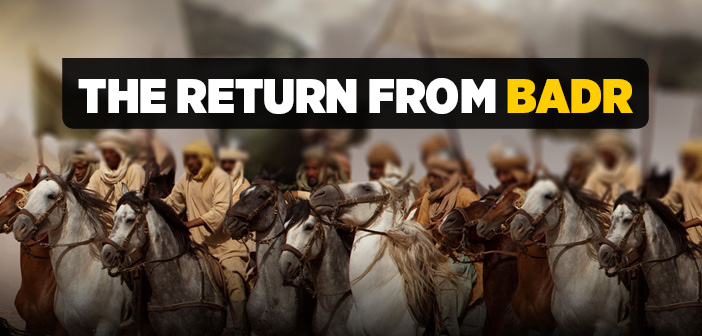What is no benefit in being muslim without worship?
As the Blessed Prophet -upon him blessings and peace- returned to Medina having accomplished the set goals, Urwah bin Masud, the leader of Taif, hastily arrived in town to declare his acceptance of Islam. Without further ado, he then returned to his hometown of Taif and began inviting the locals to Islam. But having years ago stoned the Prophet of Allah -upon him blessings and peace- who had done naught but invite them to the Truth, the locals reacted even more brutally against Urwah -Allah be well-pleased with him-. Showering him in arrows, they martyred him.[1]
The Blessed Prophet -upon him blessings and peace- then commanded Malik -Allah be well-pleased with him-, the chieftain of Hawazin who was reinstated in his leadership after becoming Muslim, to subdue Taif. Malik’s -Allah be well-pleased with him- persistent raids on the town wore the Thaqif down, forcing them to remain trapped in their forts. Perturbed, they sent their notables to Medina.[2]
To warm their hearts to Islam, the Blessed Prophet -upon him blessings and peace- hosted the Thaqif delegate inside the Masjid.[3] That way, they got to hear the Quran the Companions recited at night and during tahajjud salat, as well as seeing Muslims line up, shoulder to shoulder, for the five daily salats.[4]
Eventually, the Thaqif delegate said they were ready to become Muslim on the condition they were exempted from salat.
“There is no benefit in religion without ruqu (salat)”, was the Prophet’s -upon him blessings and peace- response. (Abu Dawud, Kharaj, 25-26/3026)
Thaqif were then foolish enough to demand that he allow Lat, their venerated idol, to remain in its place for another three years. When their request was declined, they further vied for a period of another month for the idol to remain. Of course, this, too, was denied. Then helpless, they became Muslim. Then they asked to be exempt from at least demolishing Lat themselves. The Noble Prophet -upon him blessings and peace- did not insist and sent Abu Sufyan and Mughirah -Allah be well-pleased with them- to execute the task instead.[5] Strange enough, as the idol fell to the ground, the women of Thaqif ran out on to the streets of Taif and began mourning. But it would not be long before they would completely forget even the names of their former idols and become sincere Muslims, appreciative of the excellence of Islam.
The compassionate prayer the Blessed Prophet -upon him blessings and peace- had made in the ninth year of the Meccan era for the guidance of the people of Taif, despite their vicious treatment of him, had now truly become realized.
The Thaqif delegate was taught the obligatories of Islam and the rules they needed to know for the daily routines of worship. The Blessed Prophet -upon him blessings and peace- also told them to fast in the remaining days of the month of Ramadan in which they happened to be at the time. Bilal Habashi -Allah be well-pleased with him- would deliver their sahur and iftar meals, to begin and end their fasts, throughout their stay in Medina.[6]
The Prophet of Allah -upon him blessings and peace- would meet with the delegates that came to see him whenever he was available, day or night, and give them lengthy advices about their issues.[7] Likewise, he met regularly with the Thaqif envoy after isha salat. Once, as they stood talking for a lot longer than usual, the Blessed Prophet -upon him blessings and peace- even felt the need to put the weight of his body on one leg and rest the other.[8]
Aws ibn Huzayfah -Allah be well-pleased with him-, a member of the then Thaqif delegate, recounts:
“The Messenger of Allah -upon him blessings and peace- arrived later than usual, at one time, after isha salat. ‘What was it that kept you, Messenger of Allah?’ we asked when he turned up.
‘I have made it personal duty to read a hizb of Quran a day. I did not want to come until I completed that’, the Messenger of Allah -upon him blessings and peace- replied.
Come morning, we asked the Companions how they read the Quran in hizb. They explained, ‘We make the first three surah the first hizb, then the following five the second hizb, then in order, we join the next seven surah, then the next nine, then the next eleven and then the next thirteen and make one hizb of each. And we then begin with Surah Qaf and make a final hizb until the end. We thereby read the Quran in seven hizb.’” (Ahmad, IV, 9; Ibn Majah, Salat, 178)
Being a declaration from Allah, glory unto Him and a trust bequeathed by the Prophet -upon him blessings and peace- , the Companions used to place great importance on the Holy Quran. Not only would they recite it lengthily during salats, they would also be sure to recite it extensively during journeys, battles and at night. They were never able to get enough of the zest of reciting the Quran; not a single day would pass without them reciting the Holy Book.[9] They used to begin their days with the Quran and would advise anyone suffering from an illness of the eye to stare at the pages of Quran. Othman -Allah be well-pleased with him- is even reported to have worn out both his copies of the Quran from excessive reciting.[10]
The most enthusiastic about the Quran among the representatives of Thaqif was Othman ibn Abi’l-As. Way before the other delegate members and without them knowing, he had pledged allegiance to the Blessed Prophet -upon him blessings and peace- and become Muslim. Because he was their youngest, he was left behind to keep an eye out on the mounts. As the others would return to him in the midday heat to take a nap, Othman -Allah be well-pleased with him- would go next to the Blessed Prophet -upon him blessings and peace- and ask him questions on various matters, listen to and learn the Quran. He was thereby able to hear and memorize some surah directly from the Prophet of Allah -upon him blessings and peace-. If he found the Prophet of Allah -upon him blessings and peace- to be busy, then he would either go to Abu Bakr or Ubay ibn Kaab -Allah be well-pleased with them- and ask them what he had in mind or read to them what he had memorized. The Blessed Prophet -upon him blessings and peace- was much fond of Othman’s -Allah be well-pleased with him- enthusiasm and took a special liking towards him. When the Thaqif delegate expressed their desire to return to Taif, they asked the Noble Messenger -upon him blessings and peace- to designate a leader from among themselves. The Prophet -upon him blessings and peace- designated Othman -Allah be well-pleased with him-, even though he was their youngest. (Ibn Hisham, IV, 185; Ibn Saad , V, 508; Ahmad, IV, 218)
[1] Ibn Hisham, IV, 194; Hâkim, III, 713/6579.
[2] Ibn Hisham, IV, 138, 195.
[3] Ahmad, IV, 218.
[4] Waqidi, III, 965.
[5] Ibn Hisham, IV, 197; Waqidi, III, 967-968.
[6] Waqidi, III, 968.
[7] Omar -Allah be well-pleased with him- states, “The Messenger of Allah -upon him blessings and peace- and Abu Bakr used to discuss a given issue concerning the Muslims until the late hours of night; and I used to be by their side.” (Tirmizî, Salât, 12/169)
[8] Abu Dawud, Shahr-u Ramadan, 9/1393.
[9] Ibn Saad, III, 75-76.
[10] Kattânî, II, 197.
Source: Osman Nuri Topbaş, The Prophet Muhammed Mustafa the Elect II, Erkam Publications





